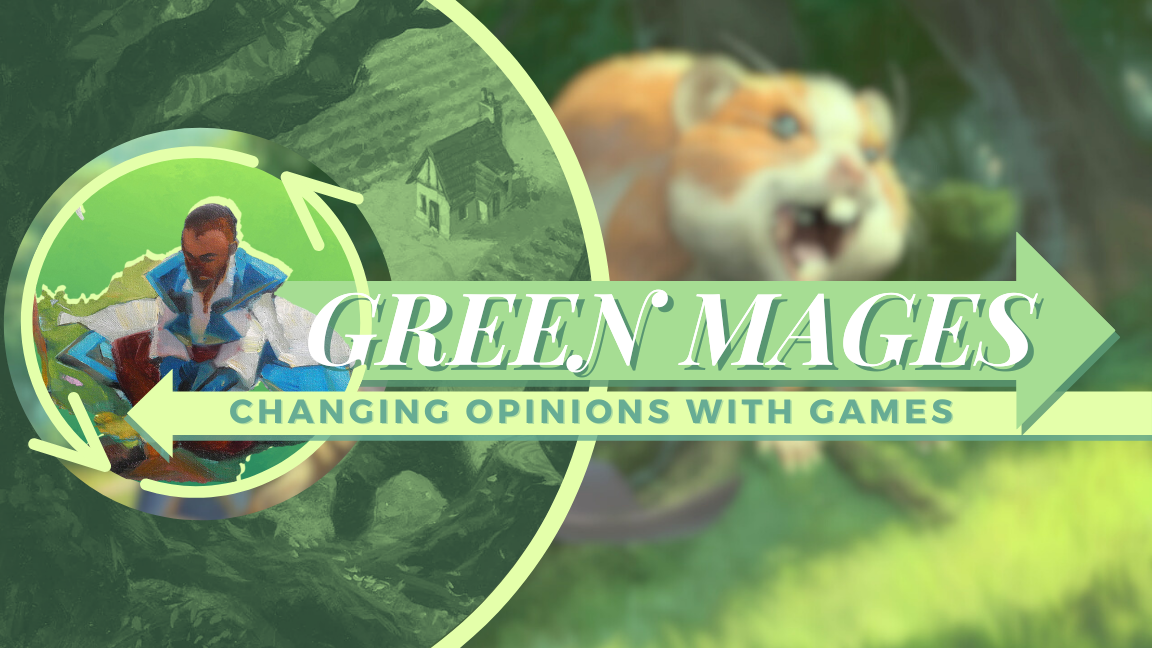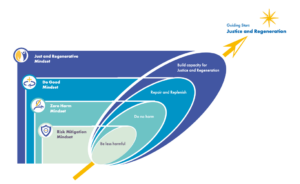Green Mages: The Power of Games to Change Opinions

Welcome back to Green Mages, a series dedicated to trying to make Magic: The Gathering a more sustainable and environmentally friendly game. This entry is part one of a three part series on how Wizards and Hasbro can leverage the game of Magic to help change perspectives on the myriad of environmental issues we are facing as a society.
In part one I am going to explore the potential that games have to influence peoples perception of the world.
In part two I am going to look at depictions of sustainability and environmental protection that already exist within the many worlds of Magic.
And in part three, the final entry of the mini-series, I want to explore what Wizards can do to marry these two paths and use the scope and size of their game in a way that can inspire all of us to take issues of environmental concern more seriously and get engaged in the fight against climate change.
What Can Businesses Do?

The genesis for this series came from the above chart which comes from Forum for the Future, a group dedicated to helping businesses create a more fair and equitable future.
This chart shows the trajectory that businesses can take to revolutionize in support of the planet. Most companies today fall somewhere in the early stages of this chart. Their environmental work is focused on reducing risk and reducing harm. They are focused on tracking their impacts and trying to make sure they cause as little harm as possible.
The second half of the chart caused a mental paradigm shift in myself and is a paradigm shift that I believe all businesses and individuals should start to consider. It's time we stop looking at sustainability and corporate responsibility as simply trying to reduce impact or harm, but to instead look at it as a way to leverage these massive forces as a tool for actively doing good for the planet and the people on it.
Positive change over reduced harm.
I believe that gaming especially has the capacity to grab this idea full stop and that gamers can use their scope and influence in a way that can help create a just and regenerative future that we would all be proud to take part in.
Interactivity and its Power to Influence
More so than most other industries, gaming, both digital and tabletop, has an edge over other consumer goods in being able to influence people's perception of reality because of their immersive nature.
Let me tell a story to help illustrate what I mean.
I've been behind the 8-ball on modern digital gaming for a number of years now (too much Magic to play, I guess), but just recently I purchased an Xbox Series S. As a lifelong Star Wars fan, I was itching to play Jedi: Fallen Order. It was the first game I played when I booted my Xbox up for the first time. Immediately I found myself transported to this galaxy far far away. The characters, the world, the sounds, all of it had me absolutely enamored.
In that first session, I sat on my couch for hours and took in all that I could of this game. I became part of that world, part of that story. Even after I had finished playing, the messages and the emotions of the game stayed with me. They impacted my reality.

Opinions of this specific game aside, I'm sure that most readers have experienced something similar. A transport to a new world where you truly feel a part of the game you are engaged with. Where time just seems to fly by. Where reality and game feel a little blurred, even if just momentarily. This is immersion, and immersion is powerful.
It's not a far step to assume that when one is in this state of immersion that the messaging of the game will have a better chance of influencing the real opinions of the individual playing the game, for good or for ill.
There is mounting evidence that violent video games can have a negative effect on the player-base. A recent as 2020, the American Psychological Association's Task Force on Violent Media concluded that, "violent video game exposure was linked to increased aggressive behaviors, thoughts, and emotions, as well as decreased empathy."
However, research is continuing to come out showing that the converse of this situation is also true, that positive messaging or experience in gaming can influence players for the better. Research conducted by Greitemeyer and Osswald found that "participants who had played a prosocial video game were more likely to help after a mishap, were more willing (and devoted more time) to assist in further experiments, and intervened more often in a harassment situation. Results further showed that exposure to prosocial video games activated the accessibility of prosocial thoughts, which in turn promoted prosocial behavior."
If games can influence prosocial behavior in real life, I'm highly confident that environmental messaging in game can translate to environmental action out of game as well.
Scope and the Ability to Reach Masses
Games also have the reach that very few other mediums have. In 2023, Stanley Pierre-Louis, the president and CEO of the Entertainment Software Association (ASE), the advocate group for the video game industry in the US, did an interview with Cynthia Williams, the soon-to-be former president of Hasbro Gaming and Wizards of the Coast (she announced on April 15th that she will be stepping down at the end of the month) at the 2023 Games for Change Festival.
(As an aside, Games for Change is a really great organization dedicated to finding ways to leverage gaming for good around the world. Highly recommend checking them out and attending their 2024 festival if you are interested. I will be there and would love to connect!)
In that interview, Stanley cited that there are roughly 3 billion people that play video games globally. Cynthia countered by saying there are actually 9 billion people around the world that play games in one way or another. That counter was not backed by data, per se, but her point is clear,: gaming is universal, and almost everyone in the world engages with games in one way or another.
A medium of that size has serious power. Back to data from the ESA, in the United States alone there are 212.6 million people who play at least one hour of video games a week. Being able to change the perceptions of a mere 1% of players on issues like climate change or environmental protection can have powerful impacts in defense of our home planet.
Games also illicit lots of discussion both online and in person. Games help people bridge gaps that they otherwise would not have been able to do, and coupling that with Earth-conscious or society-positive storytelling can be a powerful way to help open up people to new ideas or new ways of perceiving the world. I want to highlight another interaction shared in the interview cited above.
Before her time at Wizards of the Coast and Hasbro, Cynthia Williams was at Xbox and told a story about a game called Hellblade.
I have not played the game, but the main character, Senua, after experiencing extreme trauma after her village and lover were killed, spends her life suffering from psychosis. The game was praised for its honest and accurate depiction of this disorder.
Cynthia received a letter from a player who suffered from similar mental health challenges as Senua and expressed to her that they had played the game with their brother and it was "the first time he ever understood what I go through".
This is the kind of power that games can have to help reach and influence people in ways that few other mediums can.
The Potential for Change
I know it can seem silly at first to think about games, especially Magic, a game where one uses pieces of cardboard to represent spells and monsters fighting one another, as a force for good, but I would challenge you to look deeper at its potential. This is a game that is meaningful to tens of millions of players.
It's a game that brings people together. It's a game where people and ideas can be represented in ways that foster inclusion and support. It's a game that challenges us and forces us to think bigger. And I firmly believe that it's a game that could help to change and expand the perspectives of all us on major issue like climate change.
In the next two entries of the series, I'll dive further into ways that Magic has already told stories focused on environmental protection and then ultimately strategies Wizards and Hasbro can take to further integrate those messages into the game in ways that are not simply just focused on the first two stages of reducing impact, but going beyond and finding ways that they can leverage this game and this amazing player base in helping to create a just and regenerative future for us all.
I hope you will continue to join me on this journey.